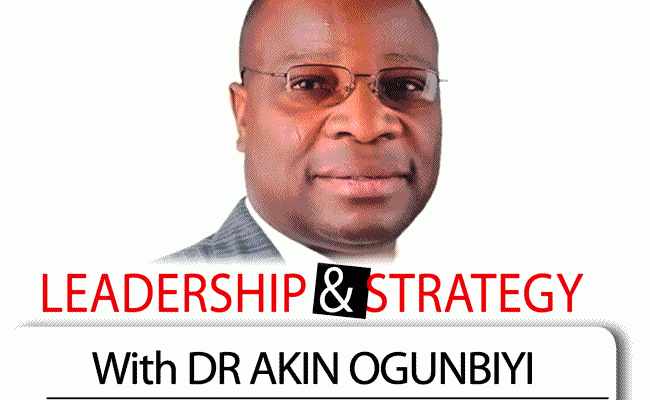
Few days ago, I was ruminating over my leadership ideals then I stumbled on Professor Martin Gutmann’s seemingly rhetorical question: “Why do we celebrate the wrong leaders?” In this column, I and my very respectable readers will run through this experiment in leadership development together by examining the “known truth”.
Leadership development is, indeed, a work in progress and therefore the need for this experiment. Occasionally, I describe leadership as a problematic dynamic. Some experts describe the qualities of a leader as intrinsic or innate. They point out that if the leader does not exhibit these intrinsic qualities, he is inelegant or “clumsy”.

Do we indeed celebrate wrong or bad leaders, either in business or government (at all levels)? We do have “leaders” who exhibit action fallacy. They display the proclivity for noisy task-oriented actions to prove they are in charge. They love tasks but fall very short in achieving results or outcomes. Their actions do not inspire, motivate or coordinate teams effectively for performance. They are always busy. They are proved or characterized by expletives. They love to fill up hours merely for effect. They are most of the time, surreptitiously playing to the gallery. It is very difficult and almost impossible to draw leadership lessons from them. They are ordinary (not deep at all in their decision-making processes) but carry on and very showy as if they are extraordinary, special or exceptional.
These “leaders” love regular reports from their teams. These reports are their posters or showpieces. Whereas, they should be exploring these summaries of charts and graphs (organized data), to bring out meaningful insights in order to improve the business.
In my new book “Thoughts on Leadership, Business and Entrepreneurship” which was put together to commemorate the conferment of honorary Doctor of Business Management degree on me by Obafemi Awolowo University, Ile-Ife, Osun State, Nigeria, I gave my views on the leader who creates, delivers and captures value. The one who solves problems, improve processes and drive innovation. The leader who successfully creates and engenders the value rhythm, that forward-looking combination of cadences that sets, closes, updates and reviews processes for performance, productivity and growth. He is a good listener, a critical thinker, a motivator, mentor and expert in team building, coordination, delegation, time management and facilitation.
Who is this LEADER? He is the game changer, the creator and coordinator of smart teams; the purpose-driven helmsman, the smart energizer of SMEs (Subject Matter Experts or insight-driven salesmen); and the transformative relationship builder.
The standard measurement of success or team’s performance, is the financial bottom line, the net-net, upshot, the profit, result; and final balance.
Business sustainability strategies that drive organisation’s success now stand on the 3 Ps: Profit, People and Place (the place is where economy, social realities and environmental health overlap) and not one P (financial bottom line). Today’s business must understand that long-term sustainability of the organization requires more than financial equity.
Strategic planning initiatives are normally designed to maximize profits, mitigate costs and reduce risks. But the purpose-driven leader must use business to effect positive change in addition to earnings and financial performance. There must be social impact or commitment to people. You cannot impact the shareholders alone but also the stakeholders. The leader’s broadened focus must include stakeholders impacted by business decisions namely; customers, employees and community (or marketplace). The triple Ps are the pillars and drivers of PURPOSE-DRIVEN GOALS.
The leader and game changer should regularly answer the following questions. How are your deliverables impacting the people and community? Are you making the difference by way of impactful values? Is your organisation always staying connected to the impact of value-driven deliverables? Answers to these questions will drive motivation, engagement, performance, productivity and growth internally and also broaden organisation’s scope of impactful achievements externally.
There must be clarity on the fact that the business is not just executing tasks but also making the all-important beneficial difference in the society (the marketplace).
There are some essential qualities of leaders who function at the highest level of proficiency. They craft and leverage strategies. They dynamically use the right teeming dimensions in setting the workplace up for success. They keep the morale high through effective communication, that is, listening, feedbacks and productive dialogue.
Professor David Burkus, an expert in business strategy, pointed out that “real listening goes deeper than hearing words. It is about making colleagues feel safe enough to tell you the truth, the real problem and not the sugarcoated version”. He added that when employees know that the leader is genuinely curious and open to what they have to say, that is when the walls come down. That is when you get to the heart of the problems as well as challenges that must be urgently sorted out. According to the erudite Professor: “When your people know they can tell you the hard truths without fearing backlash, you start solving the real problems. He noted that when you listen to learn, you gain the power to lead authentically.
Let me conclude with my favourite take on the ultimate goal of leadership. It is WINNING. The leader wins with exceptional value-adding differentiating choices. He delivers dividends with highly beneficial choices. He sets the goals; creates the plan and puts together engaged and optimally motivated followers who voluntarily put forward their best efforts and get the work done. He leads the team (or teams) with outcome-oriented professionalism and his organization thrives on interpersonal dynamics and relationships that are not self-serving. The leader executes the plans with the help of others, he leads with exceptional empathy and love, manages the process and gets the work excellently done.
It is very important that the leader leads to win in his playing field. That is his ultimate goal. His effectiveness is measured by how he identifies and closes performance gaps. Also, how he achieves productivity with accountability as bedrock. He moves the needle of productivity and benefits-delivering growth. He clearly and satisfactorily crosses the finish line.
READ ALSO: Leadership and moral conscience







